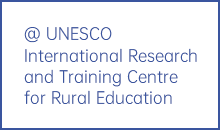Education is an indispensable component and a key enabler for sustainable development. From the launch of the “Education for All” initiative in 1990, to the adoption of the Sustainable Development Goal 4 (SDG4) of the 2030 Agenda for Sustainable Development in 2015, education has long held a special place across the world in eradicating poverty and shaping a sustainable world. Aiming to ensure inclusive and equitable quality education and promote lifelong learning opportunities for all, SDG 4 has set out comprehensive development goals and a framework for the future of education. However, as the UNESCO Futures of Education Report has pointed out and the Transforming Education Summit (TES) further appealed for, in the face of the global crisis, education has not yet fulfilled its promises to shape just, resilient, and sustainable futures; therefore, education itself needs further transformation.
This is more the case in rural areas. Half of the world’s population lives in rural areas, including four out of every five people living below the poverty line (World Social Report, 2021). Poverty and inequalities persist in rural areas. Education is expected to be a great enabler, but in many cases, it becomes a great divider. Rural educational disadvantage exists in many countries. It includes inequalities in educational outcomes, such as test scores and high school graduation rates, as well as inequalities related to educational opportunities and experiences in schools. According to the UIS and World Bank’s learning poverty indicators, half of the children in low- and middle-income countries, where the rural population comprises over 60 percent of the total population, are unable to read and understand simple text by age 10, and the challenges faced by Sub-Saharan Africa are particularly acute, with nine of ten children being learning poor. Also, data from the Program for International Student Assessment (PISA) have shown that among economically developed countries, the academic performance of 15-year-old students in cities with 100,000 or more residents is, on average, about one-half year of schooling higher than that of their peers in smaller towns and communities. A rural education crisis means that the rural population is missing out on the critical opportunities for personal empowerment and societal development. Under the global call for education transformation, we propose to reflect on these fundamental questions concerning rural education: what should education in rural areas be like? How can it be transformed? In what way can education contribute to rural development?
The UNESCO International Research and Training Centre for Rural Education (INRULED) focuses on education for rural transformation. It aims to bring about positive changes in the thinking and behaviour of rural people, and to achieve the social, economic, and ecological development of the rural areas. Since its founding in 1994, INRULED has identified five thematic areas that are critical for sustainable rural development: namely, gender equality and women’s leadership, ICT in education for rural development, skills development for rural transformation, teacher education and teacher professional development, and education in ecological civilization and sustainable development. The themes are still very relevant today and finds renewed expression in the SDG4 and, more recently, in the Futures of Education Report and the vision statement of the Transforming Education Summit.
In this context, the proposed book seeks to examine global cases on education for rural development to demonstrate the breadth and depth of commitment, reflection, and innovation in rural education. It welcomes thinking pieces related to the five particular themes of INRULED’s concern, but also welcomes pioneering and transformative ideas and practices that advance related theoretical and practical exploration.
It is hoped that this volume will foster collaboration and sharing of responsibility among global researchers, policymakers, and practitioners and provide multiple lenses to view rural education in many countries and economies. This book will appeal to academics, professionals, and policymakers working in the field of rural education. The book is designed to serve as a resource for research and study related to rural education in worldwide contexts.
Interested authors are invited to submit the abstract for his/her proposed chapter before 31st July, 2023, to Ms. Yuan’an FANG (project coordinator) at fangya@inruled.org. If the proposed abstract is accepted, the author is expected to contribute a full article (6000-7000 words in length) before 31st August 2023, according to the timeline of the publishing schedule listed below. The template of the proposing abstract can be find in the attachment.
Operational Definitions
1. Rural Education:
Rural education refers to education in rural areas. It comprises both formal and informal educational forms, such as early years education, primary and secondary education, technical and vocational education, and adult continuing education. In contrast with urban education, rural education emphasizes the geographic characteristics of education, which is located in socially and economically underdeveloped areas and. It is imperative for the economic, social, and environmental well-being of vibrant and productive rural communities.
2. Rural Development:
Rural development is a process that use the resource utilization and efficient management to reconstruct the rural social economic status and optimize the geographical space to improve the function of rural regional system. Rural development is essential for the achievement of the 2030 Agenda for Sustainable Development with the guiding principle of “leaving no one behind” (World Social Report 2021). It is the process of improving the quality of life and well-being of people living in rural areas by achieving the Sustainable Development Goals (SDGs) in the economic, social, and environmental dimensions.
Proposed Publisher: Springer
Editors: Professor Xiaodong Zeng, Dr Tongtong Zhao and Dr Philip Wing Keung Chan
Tentative book schedule
15th April 2023 - Deadline: Call for chapter contribution
31st July 2023 - Confirm book chapter contributors
31st August 2023 - Deadline for the first draft manuscripts
30th September 2023 - Editors’ review
31st October 2023 - Deadline of second draft manuscripts
30th November 2023 - External reviewer report received / Editors’ 2nd review
31st December 2023 - Completion of the final manuscripts
15th February 2024 - Completion of copyediting
28th February 2024 - Final manuscripts to Springer for publishing
August 2024 - Expected release of the edited book













